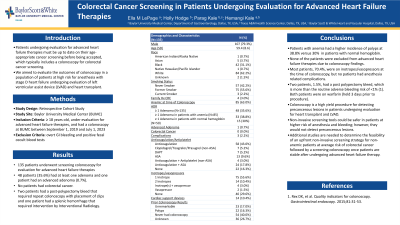Tuesday Poster Session
Category: Colorectal Cancer Prevention
P3821 - Colorectal Cancer Screening in Patients Undergoing Evaluation for Advance Heart Failure Therapies
Tuesday, October 29, 2024
10:30 AM - 4:00 PM ET
Location: Exhibit Hall E

Has Audio

Ella M. LePage, MD
Baylor Scott & White Medical Center
Dallas, TX
Presenting Author(s)
Ella M. LePage, MD1, Holly Hodge, 2, Parag Kale, MD1, Hemangi Kale, MD1
1Baylor Scott & White Medical Center, Dallas, TX; 2Texas A&M School of Medicine, Dallas, TX
Introduction: Patients undergoing evaluation for advanced heart failure therapies must be up to date on their age-appropriate cancer screening before being accepted, which typically includes a colonoscopy for colorectal cancer screening. We aimed to evaluate the outcomes of colonoscopy in a population of patients at high risk for anesthesia (ASA 4) with stage D heart failure undergoing evaluation for advanced heart failure therapies such as heart transplant or left ventricular assist device.
Methods: We performed a single center retrospective chart review on adult patients who were under evaluation for advanced heart failure therapies and had a colonoscopy between September 1, 2019 and July 1, 2023. We excluded patients who had overt GI bleeding and those with positive fecal occult blood tests.
Results: During the study time, 135 patients underwent a screening colonoscopy for evaluation for advanced heart failure therapies. There were 107 males (79.3%) and 28 females (20.7%) with a mean age of 59.4 (SD 8.6). 48 patients (35.6%) had at least one adenoma and one patient had an advanced adenoma (0.7%). No patients were found to have colorectal cancer. Two patients had a post-polypectomy bleed that required repeat colonoscopy with placement of clips and one patient had a splenic hemorrhage.
Discussion: Patients with anemia had a higher incidence of polyps at 38.8% versus 30% in the patients with a normal hemoglobin. None of the patients were excluded from advanced heart failure therapies due to colonoscopy findings. Most patients (70.4%) were on inotropes/vasopressors at the time of colonoscopy, but no patients had anesthesia related complications. Two patients (1.5%) had a post polypectomy bleed requiring intervention, which is more than the routine adverse bleeding risk of < 1% (1). Both patients were on warfarin (held 3 days prior to procedure). Colonoscopy is a high yield procedure for detecting precancerous lesions in patients undergoing evaluation for heart transplant and LVAD. While non-invasive screening tools could be safer in patients at higher risk of anesthesia and bleeding, they would not detect precancerous lesions. Additional studies are needed to determine the feasibility of an upfront non-invasive screening strategy for non-anemic patients at average risk of colorectal cancer followed by a screening colonoscopy once patients are stable after undergoing advance heart failure therapy.
1. Rex DK, et al. Quality indicators for colonoscopy. Gastrointestinal endoscopy. 2015;81:31-53.
Note: The table for this abstract can be viewed in the ePoster Gallery section of the ACG 2024 ePoster Site or in The American Journal of Gastroenterology's abstract supplement issue, both of which will be available starting October 27, 2024.
Disclosures:
Ella M. LePage, MD1, Holly Hodge, 2, Parag Kale, MD1, Hemangi Kale, MD1. P3821 - Colorectal Cancer Screening in Patients Undergoing Evaluation for Advance Heart Failure Therapies, ACG 2024 Annual Scientific Meeting Abstracts. Philadelphia, PA: American College of Gastroenterology.
1Baylor Scott & White Medical Center, Dallas, TX; 2Texas A&M School of Medicine, Dallas, TX
Introduction: Patients undergoing evaluation for advanced heart failure therapies must be up to date on their age-appropriate cancer screening before being accepted, which typically includes a colonoscopy for colorectal cancer screening. We aimed to evaluate the outcomes of colonoscopy in a population of patients at high risk for anesthesia (ASA 4) with stage D heart failure undergoing evaluation for advanced heart failure therapies such as heart transplant or left ventricular assist device.
Methods: We performed a single center retrospective chart review on adult patients who were under evaluation for advanced heart failure therapies and had a colonoscopy between September 1, 2019 and July 1, 2023. We excluded patients who had overt GI bleeding and those with positive fecal occult blood tests.
Results: During the study time, 135 patients underwent a screening colonoscopy for evaluation for advanced heart failure therapies. There were 107 males (79.3%) and 28 females (20.7%) with a mean age of 59.4 (SD 8.6). 48 patients (35.6%) had at least one adenoma and one patient had an advanced adenoma (0.7%). No patients were found to have colorectal cancer. Two patients had a post-polypectomy bleed that required repeat colonoscopy with placement of clips and one patient had a splenic hemorrhage.
Discussion: Patients with anemia had a higher incidence of polyps at 38.8% versus 30% in the patients with a normal hemoglobin. None of the patients were excluded from advanced heart failure therapies due to colonoscopy findings. Most patients (70.4%) were on inotropes/vasopressors at the time of colonoscopy, but no patients had anesthesia related complications. Two patients (1.5%) had a post polypectomy bleed requiring intervention, which is more than the routine adverse bleeding risk of < 1% (1). Both patients were on warfarin (held 3 days prior to procedure). Colonoscopy is a high yield procedure for detecting precancerous lesions in patients undergoing evaluation for heart transplant and LVAD. While non-invasive screening tools could be safer in patients at higher risk of anesthesia and bleeding, they would not detect precancerous lesions. Additional studies are needed to determine the feasibility of an upfront non-invasive screening strategy for non-anemic patients at average risk of colorectal cancer followed by a screening colonoscopy once patients are stable after undergoing advance heart failure therapy.
1. Rex DK, et al. Quality indicators for colonoscopy. Gastrointestinal endoscopy. 2015;81:31-53.
Note: The table for this abstract can be viewed in the ePoster Gallery section of the ACG 2024 ePoster Site or in The American Journal of Gastroenterology's abstract supplement issue, both of which will be available starting October 27, 2024.
Disclosures:
Ella LePage indicated no relevant financial relationships.
Holly Hodge indicated no relevant financial relationships.
Parag Kale indicated no relevant financial relationships.
Hemangi Kale indicated no relevant financial relationships.
Ella M. LePage, MD1, Holly Hodge, 2, Parag Kale, MD1, Hemangi Kale, MD1. P3821 - Colorectal Cancer Screening in Patients Undergoing Evaluation for Advance Heart Failure Therapies, ACG 2024 Annual Scientific Meeting Abstracts. Philadelphia, PA: American College of Gastroenterology.
